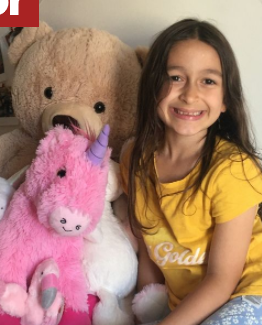October 08, 2021

Last month, Nazanin Zaghari-Ratcliffe marked her 2,000th day detained by the Islamic Republic.
Each morning, Nazanin and her daughter, Gabriella, perform the same ritual. Over a video call, Nazanin, in Tehran, watches Gabriella, neat in her school uniform, brush her long hair in London.
It is something Nazanin used to do when Gabriella visited her in prison, finding that most intimate act of maternal love calming. Now it soothes them both.
Shaking it out behind her, Gabriella insists softly: “I want mummy to curl my hair. No one else can curl my hair.” And she nods resolutely that it won’t be getting cut until mummy returns home.
“Nazanin wants to be here for the first proper haircut,” explains dad Richard, stroking the long strands. “She wants to take her to the hairdresser.”
Gabriella is now seven, and has been living with Richard in their North London flat for two years. “Can we celebrate, can I stay up until midnight?” she negotiates quick as a flash, with a grin.
While the clear bond the pair have forged is one to celebrate, sadly there is little else. It is also two years since Gabriella saw her mother in person. Two years since they cuddled; two years since Nazanin brushed her hair.
The little girl was five when she was hastily granted permission to fly home to the UK from Iran with Nazanin’s brother, where she had been living with her grandparents since Nazanin’s arrest in April 2016.
Then a toddler, she and British-Iranian Nazanin, 43, had spent a short holiday in Tehran, and were about to board a flight home when Nazanin was arrested and imprisoned on spying charges.
Two years ago, still in jail serving a five-year term, Nazanin painfully agreed Gabriella should return home to begin school, crying over her lost prison visits, but never believing they would be separated for so long.
When the pandemic hit, Nazanin was released to her parents’ home on house arrest, and in April this year hoped she would be reunited with her little girl after her prison sentence ended. Instead, she was handed a new one-year term for “spreading propaganda,” and remains stuck at her parents’ home.
And her seven-year-old daughter must grapple with emotions few seven-year-olds face. “I don’t like to talk about feelings,” the tyke told a reporter from The Mirror of London.
She shows the reporter a furry worry monster with a zippered mouth in which she can place her fears. But she won’t reveal any.
“I still lie on the floor of her bedroom until she goes to sleep,” Richard tells The Mirror. “Yesterday she was tearfully saying, ‘I want Mummy back’ at bedtime. She has said a few times, ‘I want to go back to Iran, I don’t like it here’.”
That day, however, Gabriella clambered all over her dad, her demands for snacks a touching sign of trust in his unconditional love.
But rebuilding their bond was painful, Richard says. They hadn’t seen each other for three years before Gabriella returned to London. “In the beginning it was really hard to be accepted,” Richard recalls. “She’d cry of a night saying she wanted her grandmother, her mummy, ‘No Daddy, no Daddy’. Now, she can be very cuddly, but it took a while before I was the person she would turn to.”
In her bedroom with a “big girl’s bed” where the cot Nazanin chose used to be, she shows the reporter March, the doll she brought from Iran whose ears Richard helped her pierce during lockdown.
Then she shows her box of toy Fidgets. She explains: “They are for calming me down, when I’m feeling sad and cross.”
School had been a “leveler,” Richard says. “She wanted to be English, normal, not talk about Mummy being in prison.” But Britain’s coronavirus lockdown focused all attention on her and Richard and Nazanin on video calls.
Now, back at school, her behavior has changed, which is why she joined a group for pupils struggling with their emotions, to encourage them to talk. “Gabriella doesn’t like to talk about sad subjects,” her father explains.
For him, her return to the UK has reanimated his stagnant home. “Every day is a new day, ‘What are we doing?’ There isn’t the space for self-pity on the sofa,” he says. “It has become a living home again.”
But for Nazanin, witnessing this is hard. She “hides her crying from us,” Richard says, but is depressed.
While Nazanin calls twice a day, Gabriella can be distracted.
“Often she says, ‘I’m watching TV’,” says Richard. “Or Nazanin watches her husband exasperated when Gabriella won’t eat her dinner. She sees a stand-off on food, and gets really upset.”
Meanwhile, the campaigning to bring Nazanin home continues, with Gabriella joining in. Recently, she knocked on the door of No. 10 Downing Street, handing in a letter signed by 175 MPs and peers urging the government take more action.